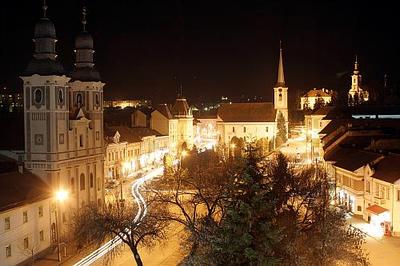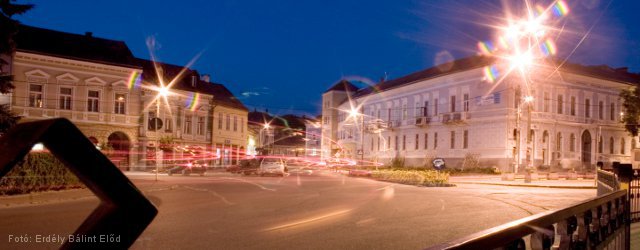People just started buzzing on the city’s streets, the night is just beginning. The sky is blending in beautiful colours- red, orange with a long, irregular purple line in it. It is a sweet, warm summer evening. Suddenly, she can hear the city’s old church clock tick 9 o’clock.

As she passes by the brick-built, snug houses, communist flats and clamorous pubs, she can hear people cheerfully laughing, or on the contrary, loudly arguing. She just grasped that everybody is speaking her mother-tongue… in a way it feels so strange and different. While thinking about all these things, looking at the old architecture, observing people and just simply enjoying the little things life offers, she realises how forgotten the city of Szekelyudvarhely really is, where the locals mainly speak Hungarian, in the middle of Romania.

Almost 100 years ago, I bet she would have felt different. She wouldn’t have believed about herself that she is a stranger, a divergent, an outsider, on the contrary… she would have felt good, fulfilled, just like being home.
How is it possible that Hungarians are inhabitants on Romanian territory?! Why quite a few cities in Romania have a bigger Hungarian population than Romanian?!
Szekelyudvarhely is the second largest city in Harghita county, Transylvania, Romania. It has a population of 34,257 out of which 95,8% are ethnic Hungarians, making it the urban settlement with the third-highest proportion of Hungarians in Romania.

The Hungarian minority of Romania is the largest ethnic minority in Romania, consisting of 1,227,623 people and making up 6.1% of the total population, according to the 2011 census.
Most ethnic Hungarians of Romania live in areas that were, before the 1920 Treaty of Trianon, parts of Hungary. Encompassed in a region known as Transylvania. The land she is standing now on was part of the Austro-Hungarian Empire a century ago until through the Treaty of Trianon became part of Romania instead.
Austria-Hungary signed the Treaty of Trianon in 1920. The treaty’s policy states that “Hungary and her allies accepts responsibility for causing the loss and damage to which the Allied and Associated Governments and their nationals have been subjected.” The treaty was part of the post-World War 1 settlement and it was a contract of punishment of Central Powers for starting war and principle of national self-determination.
However, many people and not only Hungarians, don’t agree with this and don’t feel the same way. Lord Rothermere strongly supported revision of the Treaty of Trianon in favour of Hungary. On 21 June 1927, he published an editorial in the Daily Mail, entitled “Hungary’s Place in the Sun”, in which he supported a detailed plan to restore to Hungary large pieces of the territory it lost at the end of the First World War.
So almost 100 years later she finds herself lost between all these identities.
In her mid-late teenage years, she started thinking about deeper questions. She’s started doubting her own identity and started questioning whether she’s Romanian or Hungarian, and started thinking about her origin. “Where’s home?” was the biggest question for her. She has never felt fully accepted by neither of them. Although she was born and raised in Romania, Romanians always considered her an outsider just because of the language she is speaking. On the other hand, when visiting Hungary, she always heard people saying: “you are not Hungarian.. you are from Transylvania.”
I was curious what others think and I’ve discovered some very interesting thoughts. I asked both Romanians and Hungarians living in Romania about what they think about each other and where do they feel like home. The president of the Romanian Society, Alex Ilie said to me: “The Hungarians are our step-brothers, with whom we live the same bad and good. When we are together, we don’t fight wars, but we find ourselves in very good friendship, and I’m telling you this from my own experience. I consider that my home, the Romanian land, is as much theirs as it is mine.”
Although they never met each other, one is Romanian, the other Hungarian, they expressed the same thread. Mózes Ambrus, a Hungarian patriot said: „As part of a minority group, it’s hard for me to tell, what home really is for me. The whole world, the other nations don’t understand our situation because they can’t accept the fact that we didn’t move anywhere else, but another country took over our ancestor’s homeland. I don’t think about my home as a country. Neither Romania or Hungary. My home is Transylvania. That region, where every nation could feel like home through centuries. That place, where the residents, be that Hungarians, Romanians, Szekelys or Saxons face the same difficulties and issues, and they solve them together.”